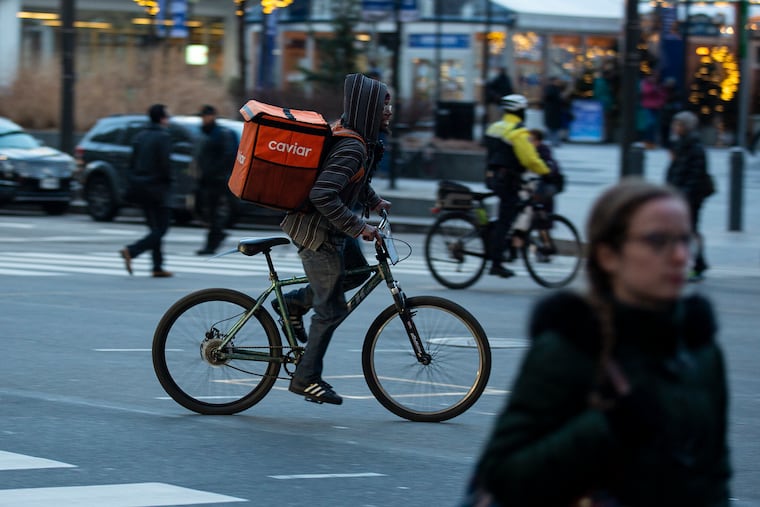Philadelphia City Council bill would cap fees that delivery services can charge restaurants
The bill would cap fees at 10% of the pre-tax costs of orders.

With restaurateurs complaining of some delivery services charging commissions of up to 30%, Philadelphia City Council has a bill on its plate that would limit fees that Grubhub, DoorDash, and other companies could charge to deliver meals during the coronavirus pandemic.
The bill, similar to others under consideration or enacted in cities around the country, would temporarily limit delivery fees to 10% of the pre-tax costs of the orders. It is scheduled for a Commerce Committee hearing at 2 p.m. Thursday.
Restaurants have been restricted to takeout or delivery service since March under state decree, though some restaurants may offer outdoor dining effective Friday.
» READ MORE: Outdoor dining returns with fresh air, umbrellas — and social distancing
Several restaurants have closed, and the fees have made it all the more difficult for the survivors “to weather this unprecedented economic storm,” said Council Majority Leader Cherelle L. Parker, who introduced the bill last week.
“Many restaurants now find themselves wholly reliant on third-party food delivery services to stay in business,” the bill states.
Not surprisingly, the Pennsylvania Restaurant and Lodging Association backs the bill. The pandemic, said Melissa Bova, the association’s vice president for government affairs, “has taken an incredible toll on our industry, and this legislation is a positive step.”
New York City has capped fees at 15%, but Parker’s bill is patterned more closely on the tougher bill enacted in Jersey City, N.J., which has a 10% cap, said Rachel Meadows, her chief of staff.
» READ MORE: DoorDash and Caviar to slash food delivery fees by 50%
The bill also would prohibit delivery services from invoking the names of restaurants on apps “without obtaining written consent.”
Some services routinely add restaurants to their rosters, hoping that customers will order through the service. Often, though, the services’ menus differ from the actual menus, leading to confusion.
The food delivery business has become an estimated $10.2 billion industry.
» READ MORE: Restaurants and customers are getting caught in a food-delivery war
According to an analysis by the consumer-research firm Second Measure, about 80% of the Philadelphia-area market as of November was roughly split between Grubhub and DoorDash, the nation’s largest food delivery company.
A DoorDash spokeswoman said that beyond simply meal deliveries, the fees paid for a variety of the company’s costs, including insurance.
“We want restaurants to succeed,” she said.
“We’ve seen arbitrary caps imposed that can have the unintended consequence of reducing sales for restaurants when they in fact need them the most."
Staff writer Michael Klein contributed to this article.